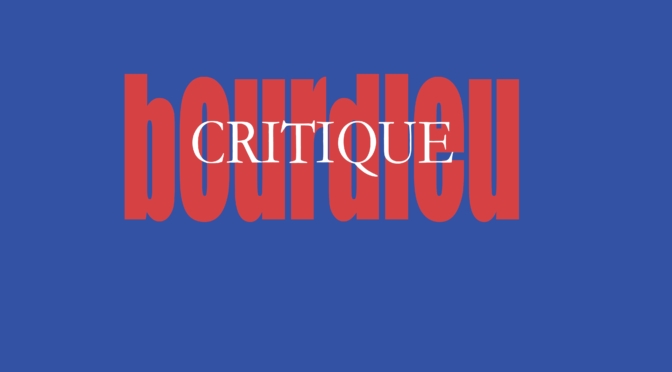Le Centre d’études sur les sciences, la technologie et la société (Institut de philosophie de l’Académie tchèque des sciences) et le CEFRES ont le plaisir de vous inviter à la conférence « La science bourdieusienne de la Science : sources, confrontations et héritages ».
Quand : Jeudi 15 décembre 2022, 10h-18h
Où : CEFRES, Na Florenci 3, Prague 1 et en ligne
Organisateur et contacts : Jan Maršálek marsalek@flu.cas.cz.
L’objectif de la conférence est de réfléchir à la conception et à la pratique de la sociologie des sciences que Pierre Bourdieu développe à partir de 1975. Longtemps négligée, la sociologie des sciences et de la connaissance scientifique est devenue, dans la seconde moitié du 20ème siècle, l’une des sous-disciplines sociologiques les plus en vogue, n’hésitant pas à intervenir jusque dans la sociologie générale.
Pierre Bourdieu, célèbre et influent dans un grand nombre de domaines de la sociologie, s’est curieusement tenu à l’écart du développement spectaculaire de la sociologie des sciences que l’on situe communément dans les années 1970 et 1980. À partir de son point de vue singulier, il s’agira d’analyser les critiques intrigantes qu’il a portées sur le mouvement d’émergence de la sociologie des sciences.
La conférence a lieu dans le cadre des séminaires de sociologie et de philosophie de la physique organisés en 2022 par l’Institut de philosophie de l’Académie tchèque des sciences et le département de philosophie et d’études religieuses de la Faculté des lettres de l’Université Charles de Prague.
Programme
10:00 – 12:00 GUEST LECTURE
Pascal Ragouet, University of Bordeaux – Centre Émile Durkheim
“Science as a Field. Bourdieu’s Contribution to the Sociology of Scientific Knowledge”
– See below for the abstract –
14:00 – 18:00 ROUNDTABLE
Confirmed speakers
- Jan Maršálek, Institute of Philosophy, Czech Academy of Sciences
- Pascal Ragouet, University of Bordeaux – Centre Émile Durkheim (UMR 5116)
- Manolis Simos, National and Kapodistrian University of Athens
- Julien Wacquez, CEFRES
- Lukáš Hadwiger Zámečník, Faculty of Arts, Palacký University Olomouc
Abstract of the guest lecture
Science as a field. Bourdieu’s contribution to the sociology of scientific knowledge
Pascal Ragouet
Full Professor of sociology – University of Bordeaux – Centre Émile Durkheim (UMR 5116)
In the course of its history, the sociology of science has been traversed by several major debates. The first is the one that T. Shinn and I analysed in the book titled Controversies on Science by proposing to consider Robert K. Merton’s sociology as a form of differentiationism opposed to the anti-differentiationist tendencies of post-Kuhnian programmes of research on science such as the Strong Programme (D. Bloor, B. Barnes), the empirical programme of relativism (H. Collins, T. Pinch), laboratory studies (B. Latour and S. Woolgar, K. Knorr Cetina, M. Lynch) or the network actor theory (M. Callon, J. Law, B. Latour).
The second concerns the question of whether scientific knowledge can be sociologically analysed. With R. Merton, the sociology of science kept its distance from a sociology of scientific knowledge. The break comes with the Strong Programme and the Empirical Programme of relativism. The pendulum swings back the other way with the radical constructivism of network actor theories. Today, sociologists of science and technical innovation seem to be less concerned with scientific knowledge than with the need to think about science in society, when it is called upon by industrialists and politicians, when it feeds expertise, when it is questioned in the context of risk management and reflections on the relationship between science and democracy.
Bourdieu’s contribution to the sociology of science makes it possible to overcome these lines of conflict because it is based on a theoretical framework articulating a theory of social structuring, a theory of practice and a theory of social asymmetries. Based on two personal research projects on biology, the aim is to show the fruitfulness of this approach.
Plus d’informations ici : http://odolnaspolecnost.cz/vedeckagramotnost/
Contact de référence : Jan Marsalek at marsalek@flu.cas.cz.

